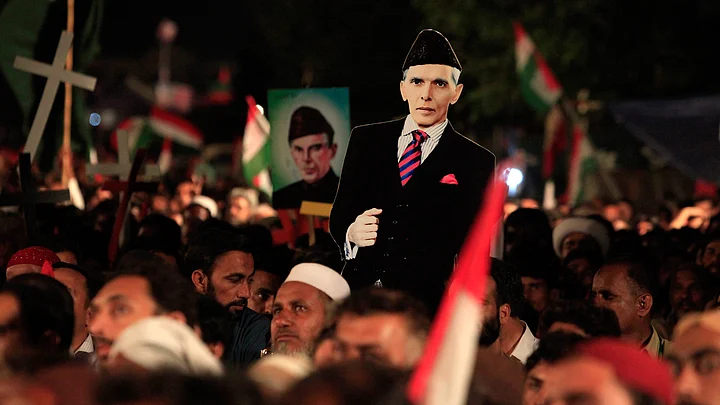Nisid Hajari’s Midnight Furies: The Deadly Legacy of India’s Partition cannot be called a delightful read, given the topic it deals with. But despite the passions it evokes, this well-told book is a brisk, easy read and what’s more, it sets the record straight on several events leading up to and after India’s bloody partition in 1947.
It is also a devastating critique of Muhammad Ali Jinnah. Hajari casts his unsparing eye equally on the other principal characters of Partition such as Jawaharlal Nehru and Louis Mountbatten, MK Gandhi and Sardar Patel, but it is the Quaid-i-Azam who comes off as particularly flawed.
Of course, this isn’t to suggest that Hajari’s book is a hatchet job on Jinnah, far from it. The journalist does paint Jinnah in all his hues, and Midnight’s Furies is a reminder that Jinnah should be viewed in the context of his times and relationships.
Jinnah died on September 11, 1948. On this, his 67th death anniversary, here are some excerpts.
Jinnah and Nehru
Although not a defiant unbeliever like Nehru, Jinnah enjoyed a nightly drink, which of course is forbidden in Islam. He showed up at mosque only to give speeches, not to pray. Both were proud, rigid men – and dangerously thin-skinned...
In the flesh, any similarities disappeared. Nearing seventy, Jinnah was as frail as his rival was vigorous. A lifelong two-pack-a-day cigarette habit left him gasping for breath at times, and more than once he was bid-ridden for weeks at a stretch on doctor’s orders. He carried only 140 pounds on his 6-foot frame; cheekbones jutted out of his cadaverous face like the edges of a diamond.
–Midnight’s Furies: The Deadly Legacy of India’s Partition by Nisid Hajari
Jinnah and his Attitude to Money
His difficult early years as a lawyer in Bombay instilled in Jinnah a lifelong penuriousness. Years later, after his bank accounts had fattened with rupees, friends would ask him why he still totted up the servants’ salaries and expenditures every day. “This is hard-earned money!” he’d exclaim. “This is hard-earned money!”
–Midnight’s Furies: The Deadly Legacy of India’s Partition by Nisid Hajari
Jinnah and the ‘Khilafat’ Movement
What histories rarely acknowledge, though, is that Jinnah worried less about Hindus than about the danger of inflaming religious passions among Muslims.
...He feared that their [extremist faction] rage would inevitably turn from the British to the Hindus. Gandhi, on the other hand, threw his support behind the Khilafat movement; in turn, Muslim votes gave him the slight majority he needed to launch his satyagraha movement. Years later, Gandhi recalled Jinnah telling him he had “ruined politics in India by dragging up a lot of unwholesome elements in Indian life and give them political prominence, that it was a crime to mix up politics and religion the way he had done.
–Midnight’s Furies: The Deadly Legacy of India’s Partition by Nisid Hajari
Jinnah’s Speech on August 9, 1947
Jinnah himself seemed to have abandoned the cheap sectarian rhetoric that had marked his decade long struggle against Nehru and the Congress. “You are free,” he told Hindus and Sikhs at the opening session of Pakistan’s Constituent Assembly.
–Midnight’s Furies: The Deadly Legacy of India’s Partition by Nisid Hajari
The Death of Jinnah
The following morning, three planes landed at Quetta’s airport in far-off Baluchistan. The Quaid, dressed in a new suit and wearing freshly shined shoes, was carried to his sleek new Viking on a stretcher, weakly saluting the plane’s British crew. He had developed a bad case of pneumonia; doctors urgently needed to get him back to the capital for treatment.
The trip was kept secret. In Karachi, the Viking was met by an army ambulance but no officials. On the drive into town, the truck broke down near a camp full of rag-clad Punjabi refugees. For an hour, Jinnah lay in the sweltering ambulance, a nurse fanning the flies away, before another vehicle arrived. By the time the convoy reached Government House, whatever strength he had left had ebbed away. Doctors propped him up and tried to give him an injection, but his veins had collapsed. “God willing, you are going to live,” a doctor tol him at 9:50 p.m. “No, I am not,” Jinnah murmured. A half-hour later he was dead.
–Midnight’s Furies: The Deadly Legacy of India’s Partition by Nisid Hajari
Jinnah and Partition
There is little question that Jinnah was the most polarizing figure in the Partition drama. He is easy to blame. His forbidding personality made compromise difficult, if not impossible, and he was criminally negligent about thinking through the consequences of the demand for Pakistan. A vindictive streak ensured he was surrounded mostly by sycophants, rather than independent-minded subordinates who might have moderated his views.
Yet from the moment in 1937 when the Congress Party rejected any partnership with the Muslim League, Nehru – suave, sensitive, handsome Nehru – contributed very nearly as much as Jinnah to the poisoning of the political atmosphere on the subcontinent.
–Midnight’s Furies: The Deadly Legacy of India’s Partition by Nisid Hajari
So there you have it: there is little use in vilifying Jinnah. Rather, on what is his 67th death anniversary, this complex, brilliant man deserves to be seen in the context of his times and the attitudes of his colleagues in the Congress Party.
Nisit Hajari’s Midnight’s Furies, while not concerning itself solely with Jinnah, is the perfect start to begin educating oneself on the bloody Partition of India. In it, one will encounter all the characters and events that led to his making and unmaking.
Here’s where you can buy it.
